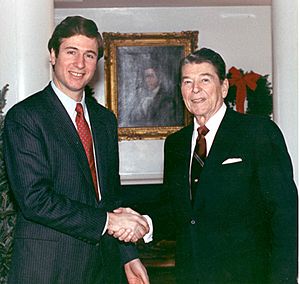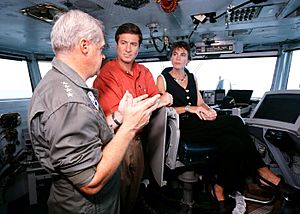George Allen (American politician) facts for kids
Quick facts for kids
George Allen
|
|
|---|---|
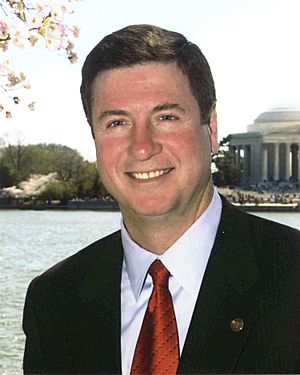
Official Senate portrait
|
|
| United States Senator from Virginia |
|
| In office January 3, 2001 – January 3, 2007 |
|
| Preceded by | Chuck Robb |
| Succeeded by | Jim Webb |
| 67th Governor of Virginia | |
| In office January 15, 1994 – January 17, 1998 |
|
| Lieutenant | Don Beyer |
| Preceded by | Douglas Wilder |
| Succeeded by | Jim Gilmore |
| Member of the U.S. House of Representatives from Virginia's 7th district |
|
| In office November 5, 1991 – January 3, 1993 |
|
| Preceded by | French Slaughter |
| Succeeded by | Thomas Bliley |
| Member of the Virginia House of Delegates from the 58th district |
|
| In office January 12, 1983 – November 5, 1991 |
|
| Preceded by | Constituency established |
| Succeeded by | Peter T. Way |
| Personal details | |
| Born |
George Felix Allen
March 8, 1952 Whittier, California, U.S. |
| Political party | Republican |
| Spouses |
Anne Rubel
(m. 1979; div. 1983)Susan Brown
(m. 1986) |
| Children | 3 |
| Residences | Virginia Beach, Virginia, U.S. |
| Education | University of Virginia (BA, JD) |
George Felix Allen (born March 8, 1952) is an American politician. He served as a U.S. Senator for Virginia from 2001 to 2007. Before that, he was the 67th governor of Virginia from 1994 to 1998. He is a member of the Republican Party.
George Allen is the son of National Football League head coach George Allen. He started his political career in the Virginia House of Delegates from 1983 to 1991. He then won a special election to the U.S. House of Representatives in 1991. After his district changed, he decided to run for governor. He won the 1993 election, defeating Mary Sue Terry.
After his time as governor, he ran for the U.S. Senate in 2000 and won. He was defeated in his re-election bid in 2006 by Jim Webb. Allen tried to win his old Senate seat back in 2012 but lost to Tim Kaine. Today, he is involved with the Young America's Foundation.
Contents
Early Life and Education (1952–1982)
George Allen was born in Whittier, California, on March 8, 1952. His father, George Herbert Allen, was a famous National Football League (NFL) coach. His father was even added to the Pro Football Hall of Fame in 2002. George has a younger sister, Jennifer, and two brothers, including Bruce Allen, who also worked in the NFL.
His family moved several times because of his father's coaching jobs. They lived in Chicago and then in Southern California. George graduated from Palos Verdes High School in 1970. He played football as a quarterback there. He then went to the University of California, Los Angeles for a year. In 1971, he transferred to the University of Virginia. He earned a degree in history in 1974. He also played on the university's football and rugby teams.
After college, Allen earned a law degree from the University of Virginia School of Law in 1977. He then worked as a law clerk for a judge.
Virginia House of Delegates (1982–1991)
George Allen first ran for the Virginia House of Delegates in 1979 but did not win. He ran again in 1982 for the 58th House District and won by a very small number of votes. He won re-election in 1983 and then ran unopposed in 1985, 1987, and 1989. He represented parts of Albemarle and Nelson counties.
During his time as a delegate, Allen supported strict laws against crime. He was a strong supporter of the death penalty. He also supported a statewide vote on whether to create a state lottery system.
U.S. House of Representatives (1991–1993)
Winning a Seat in Congress
In November 1991, George Allen won a special election for Virginia's 7th congressional district. The previous representative had resigned. Allen defeated Kay Slaughter in this election.
District Changes
After the 1990 U.S. Census, the boundaries of congressional districts were redrawn. This process is called redistricting. Allen's district was eliminated, and parts of it were moved into other districts. Because of these changes, Allen decided not to run for re-election to the U.S. House in 1992. Instead, he decided to run for Governor of Virginia.
Governor of Virginia (1994–1998)
In 1993, George Allen was elected the 67th Governor of Virginia. He served from 1994 to 1998. He won with a large percentage of the votes. Virginia's constitution does not allow a governor to serve two terms in a row, so Allen could not run for re-election in 1997.
Changes to Welfare
As governor, Allen worked to change Virginia's welfare system. He wanted to help people find jobs instead of relying on government aid for a long time. He signed a bill in 1995 that limited how long people could receive benefits. It also required people to work within 90 days of getting benefits. This program was called the Virginia Initiative for Employment Not Welfare (VIEW). After VIEW started, the number of families receiving welfare went down a lot.
Truth-in-Sentencing Laws
One of Allen's main promises during his campaign was to end parole for people convicted of serious crimes. Parole allows prisoners to be released early from jail. In 1995, a law called "Truth-in-Sentencing" (TIS) went into effect. This law made sure that people convicted of felonies served at least 85% of their sentence. This meant that prisoners served much longer sentences than before.
Standards of Learning (SOLs)
In 1995, Governor Allen supported new statewide tests for schools. These tests are called the Standards of Learning (SOLs). They measure what students learn in subjects like English, math, history, and science. The goal was to make schools more accountable for student learning. The SOLs also led to annual "report cards" for schools to show their performance.
Water Quality Concerns
During Allen's time as governor, Virginia's program for monitoring water toxins was stopped. Information about pollution in Virginia's rivers was not easily available. An investigation later found that some documents were destroyed. It also showed that information about high levels of harmful chemicals in rivers was kept hidden.
"Disney's America" Theme Park
In 1993, the Disney Company planned to build a history-themed park called "Disney's America" in Virginia. Governor Allen supported the park, saying it would create many jobs. However, many historians and people worried about the park's effect on nearby historic sites, especially the Manassas National Battlefield Park, where important Civil War battles took place. Disney eventually decided not to build the park.
Return to Private Work (1998–2001)
After leaving the governor's office, George Allen worked in the private sector. He became a partner at a law firm called McGuireWoods. He also joined the boards of some technology companies. He worked as an advisor for other companies as well.
U.S. Senate (2001–2007)
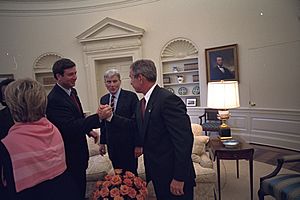
Elections
2000 Election
In 2000, Allen ran for the United States Senate and won. He defeated the Democratic Senator Chuck Robb. Allen was the only Republican to defeat a Democratic Senator that year.
2006 Election
Allen ran for re-election in 2006. He faced James H. Webb, a Democrat. It was a very close election. During the campaign, Allen made a comment that caused a lot of discussion and was seen as offensive. This event was widely reported in the news. After a close race, Allen lost to Jim Webb by a small number of votes. He decided not to ask for a recount. Many people believe the controversial comment played a big part in his defeat.
Work in the Senate
As a Senator, George Allen worked on several important laws:
- He introduced ideas for a balanced budget and a "line item veto" for the president.
- He worked on a law to help American science and engineering grow.
- He helped create the 21st Century Nanotechnology Research & Development Act. This law supported research into nanotechnology, which is science that deals with very tiny things. This program received billions of dollars in funding.
- He also helped extend a ban on certain Internet taxes.
Allen was also the chairman of the High Tech Task Force in Congress. He led the National Republican Senatorial Committee in 2002, helping Republicans gain more seats in the Senate in 2004.
After the Senate (2007–Present)
Political Plans
After losing his Senate seat in 2006, many people thought George Allen might run for president in 2008. He had visited states important for presidential campaigns. However, he later announced that he would not seek the 2008 presidential nomination. He also decided not to run for governor of Virginia in 2009.
Other Activities
In 2007, Allen became a "Reagan Scholar" with Young America's Foundation. He also started his own consulting firm, George Allen Strategies. In 2009, he started the American Energy Freedom Center, a group that focuses on energy policy.
In 2010, Allen published a book called What Washington Can Learn From the World of Sports. In the book, he compared politics to sports, talking about teamwork and following rules.
In September 2024, Allen joined other former governors in signing a letter. This letter asked current governors to confirm their states' election results after the November election.
2012 U.S. Senate Election
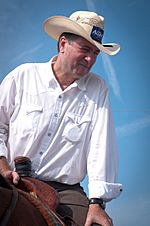
On January 24, 2011, George Allen announced he would run for his old U.S. Senate seat again. He won the Republican nomination. However, in the general election in November 2012, he lost to former Virginia governor Tim Kaine.
Electoral History
This section shows the results of some of the elections George Allen participated in.
| Party | Candidate | Votes | % | |
|---|---|---|---|---|
| Democratic | Tim Kaine | 2,010,067 | 52.87 | |
| Republican | George Allen | 1,785,542 | 46.96 | |
| Independent | Write-in candidates | 6,587 | 0.17 | |
| Party | Candidate | Votes | % | |
|---|---|---|---|---|
| Republican | George Allen | 167,452 | 65.45 | |
| Republican | Jamie Radtke | 58,980 | 23.05 | |
| Republican | Bob Marshall | 17,308 | 6.76 | |
| Republican | E.W. Jackson | 12,086 | 4.72 | |
| Party | Candidate | Votes | % | |
|---|---|---|---|---|
| Democratic | Jim Webb | 1,175,606 | 49.59 | |
| Republican | George Allen (incumbent) | 1,166,277 | 49.2 | |
| Independent Greens | Gail Parker | 26,102 | 1.1 | |
| Independent | Write-in candidates | 2,460 | 0.1 | |
| Total votes | 2,370,445 | 100 | ||
| Party | Candidate | Votes | % | |
|---|---|---|---|---|
| Republican | George Allen | 1,420,460 | 52.26 | |
| Democratic | Chuck Robb (incumbent) | 1,296,093 | 47.68 | |
| Independent | Write-in candidates | 1,748 | 0.06 | |
| Total votes | 2,718,301 | 100 | ||
| Party | Candidate | Votes | % | |
|---|---|---|---|---|
| Republican | George Allen | 1,045,319 | 58.27 | |
| Democratic | Mary Sue Terry | 733,527 | 40.89 | |
| Independent | Nancy B. Spannaus | 14,398 | 0.8 | |
| Independent | Write-in candidates | 672 | 0.04 | |
| Total votes | 1,793,916 | 100 | ||
| Party | Candidate | Votes | % | |
|---|---|---|---|---|
| Republican | George Allen | 106,745 | 63.93 | |
| Democratic | Kay Slaughter | 59,655 | 35.73 | |
| Independent | John Torrice | 566 | 0.34 | |
| Total votes | 166,966 | 100 | ||
Personal Life
George Allen married Anne Patrice Rubel in 1979, and they divorced in 1983. In 1986, he married Susan Brown. They have three children together. The Allens live in Virginia Beach, Virginia.
Allen is a member of the Presbyterian Church. He often uses ideas and phrases from football when he talks about politics. This is something many journalists and commentators have noticed.
See also
 In Spanish: George Allen (político) para niños
In Spanish: George Allen (político) para niños


